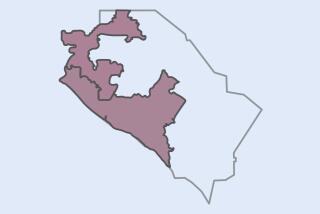Asian Entrepreneurs Look to Each Other for Support
- Share via
PALO ALTO — Once each month, from all over the San Francisco Bay Area, the Mercedes Benzes file into the parking lot at Ming’s Chinese restaurant in Palo Alto. The occasion? A meeting of the Asian American Manufacturers Assn.
The AAMA, composed largely of high-tech entrepreneurs--and those who wish to be--illustrates the success of many Asian immigrants to this country. At the same time, it serves as a voice for its members’ concerns about preserving and building on that success.
“It represents the kind of network, the kind of resources, the kind of support system that we don’t find every day in our workplace,” said John P. Chan, the group’s chairman and president of Dublin Multilayer, a Bay Area maker of circuit boards.
Clearly, the AAMA has staked out a wide terrain. It is a political advocate for Asian-Americans--providing donations to candidates--and an adviser and cheerleader for members starting businesses of their own. At the monthly meetings, guest experts have offered views on everything from labor law and foreign trade to how to speak and dress in the business world.
Cultural Bridge
Why the image consultants? “You’re in the U.S.,” explained Chan, a fifth-generation Chinese-American and a founding member. “You speak English, and you’re going to dress like the rest of us.”
The AAMA also serves as a cultural bridge and communications link from America to Asia, where it has sponsored trade shows in Hong Kong, Taiwan and Beijing. Not that the unofficial liaison role always proves comfortable.
Nelson G. Dong, a San Francisco attorney and active member, remembers the cool reception he got at the Hong Kong conference when he lectured 200 local manufacturers on restrictions against piracy of U.S. products. “It was a very quiet room,” Dong recalled during a recent dinner at Ming’s.
The AAMA was born in the 1970s, prompted by concerns that Asian-Americans were not getting a fair share of federal aid for ethnic groups. It now has more than 450 members, representing manufacturing and service firms, large corporations and private enterprises. Though predominantly Chinese, it has members from Pakistan, India, South Korea, Japan and the Philippines.
Despite the affluence of many members, those in the AAMA are quick to challenge the stereotype that all Asian-Americans are prospering in high tech and other fields. Large numbers of elderly Asian immigrants continue to struggle here, as do thousands of recent arrivals from Vietnam, Cambodia and other nations.
Fear ‘Asian Bashing’
“The laundries are still there,” said Art Takahara, a high-tech manufacturer and a member of the Mountain View, Calif., city council. “The restaurants are still there. The groceries are still there.”
In addition, members seek to guard the gains already made, pointing with concern to signs that some California universities have set de facto quotas to limit the number of Asian-American students accepted in freshman classes. And they worry about “Asian bashing”--reports of violence against Asian-Americans that seem to be sparked by Japan’s economic success.
“The Asian-Americans here in the United States are part of America, they’re not foreigners,” said David Lam, president of Expert Edge, a high-tech firm in Palo Alto. “We have to continue to work with public officials to make sure that nobody will get confused between the two.”
To achieve that goal, the AAMA last year launched a federal political action committee that has made $1,000 donations to Rep. Norman Y. Mineta (D-San Jose), Tom Campbell (R-Palo Alto) and S. B. Woo, an Asian-American candidate in Delaware for the U.S. Senate.
Another Obstacle
Its other concerns center on the workplace, where Asian-American employees sometimes wonder if they have bumped into a “glass ceiling” limiting their climb up the corporate ladder.
“We can decry it (the glass ceiling) as a social wrong,” said Chuck Chan, an immigrant from Hong Kong and a partner in AVI Management Partners, a venture capital firm in Menlo Park, Calif. “But from the standpoint of a personal career, it’s just one more obstacle that a person has to overcome.”
That is why the AAMA is so focused on broadening the skills and knowledge of Asian-Americans who currently labor within large corporations. “How do you help these individuals?” asked John Chan, “because they themselves will be mentors to others. They themselves will be leaders.”
More to Read
Inside the business of entertainment
The Wide Shot brings you news, analysis and insights on everything from streaming wars to production — and what it all means for the future.
You may occasionally receive promotional content from the Los Angeles Times.










